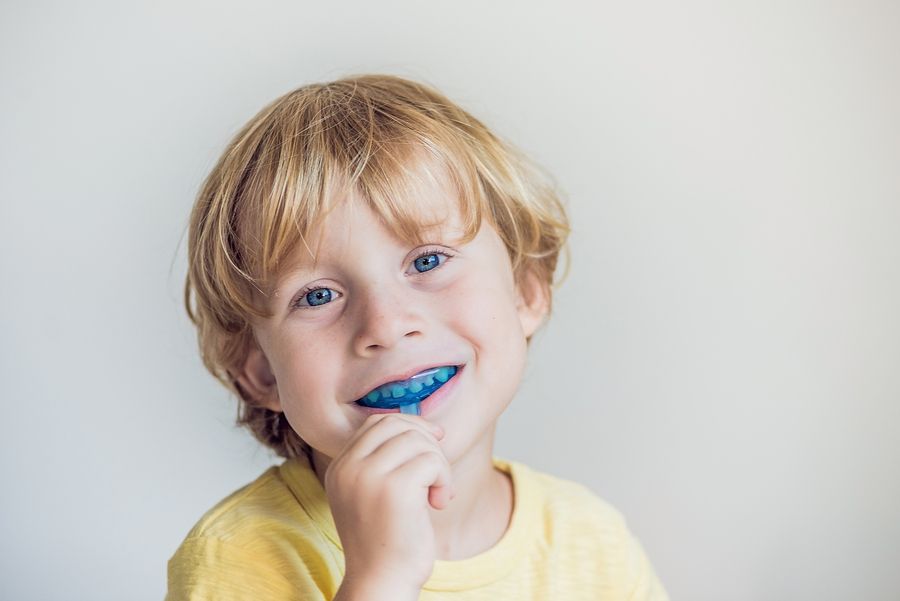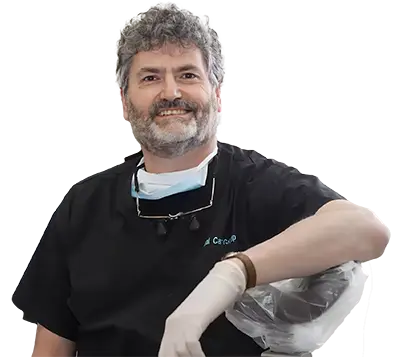We often talk about “gritted teeth” when describing someone that’s determined, furious, or stressed out.
But for some of us, involuntary clenching, grinding and gnashing of your teeth is more than an obvious poker tell.
If you grind your teeth on a regular basis and you can’t control it, you may have a condition known as bruxism.
While most of us have episodes of teeth grinding when the going gets tough, ongoing bruxism can itself turn into a reason to grit your teeth. If left untreated, it can turn into a major dental health issue.
The oral effects of teeth grinding
Just because you grind your teeth, doesn’t mean you have bruxism.
Bruxism or teeth grinding is a condition wherein you grind or clench your teeth excessively, eventually causing discomfort and damage to your teeth in the long run.
More specifically, repeated, constant grinding wears out the tough enamel exterior of your teeth and exposes the more sensitive dentin underneath.
And this drastically increases your risk of tooth decay. Your dentin are much more vulnerable to infection – not to mention, your dentin are more sensitive, turning dinnertime into quite the painful experience.
Other consequences of bruxism include:
- Intense jaw clenching
- Sore jaws when eating, especially during breakfast
- Loose, chipped or fractured teeth
- Headache and/or ear pain
- Aching teeth and jaw
- Stiffness in parts of the face including temples
- Sensitivity to hot and cold food and drinks
What causes teeth grinding? Awake vs. nocturnal bruxism
Believe it or not, there’s a lot more to bruxism than just grinding your teeth. Did you know there are two different types of teeth grinding, both with their own unique causes?
Awake bruxism
Something’s gone wrong. Plans have fallen apart. Pressure is building.
Gritting your teeth every once in a while is a completely normal reaction to stress. But when it becomes a regular habit, that’s when we start seeing tooth problems.
Anger, anxiety, frustration, tension or stress can all cause you to grit your teeth.
It can even pop up when you’re focused or deep in concentration, and that’s exactly why certain high-stress professions are overrepresented when it comes to occurrences of daylight bruxism!
Sleep bruxism
Awake bruxism can be managed when you consciously identify teeth grinding and make a concentrated effort to relax your jaw.
Unfortunately, asleep bruxism is harder to self-manage.
Sleep bruxism refers to grinding, chewing and clenching activity that happens while you sleep.
While the mechanics are identical, sleep bruxism is often linked with other sleep disorders including sleep apnoea and snoring.
In some cases, the grinding can be so severe that it can wake other people around you!
How can teeth grinding be treated?
Breaking the habit
Oftentimes, bruxism is an unconscious reaction to stress. And in many of these cases, getting away from your stressors might be all that’s needed to break the habit!
Of course, it’s not as simple as just “stopping”. Thankfully, people suffering from bruxism can talk to professionals for help. In cases of bruxism caused by psychological factors, consider talking to a health professional.
Techniques such as meditation, yoga and habit reversal can all help reduce the occurence of bruxism in your “awake” life.
Unfortunately, you can’t exactly do yoga while sleeping. In cases of nocturnal bruxism, there’s not much you can do short of physically separating both rows of teeth while you sleep.
And for that, there’s only one place to go to…
H3> Visit your Armadale dentist for teeth grinding solutions
Dental Care Group’s Armadale dentist is fully-qualified to prescribe treatments for a wide range of different dental health issues… including bruxism!
Dr Zelman Lew can prescribe a range of treatments to protect your teeth from grinding, including mouth guards and splints. These tools create a physical barrier between your top and bottom rows of teeth, and can protect your teeth from grinding while you sleep.
And if your bruxism has progressed to the point where your teeth have suffered from physical damage, our dentist can help out with that too.
Restorative procedures can be used to fix teeth damaged by excessive grinding, while also preventing further damage to the sensitive dentin inside your teeth.
Do you have an axe to grind with your bruxism?
Talk to Dental Care Group for bruxism treatments!
While it may sound fairly minor compared to the broken teeth and tooth decay your dentist normally deals with, bruxism is no laughing matter.
In order to prevent serious damage to your teeth, it needs to be taken seriously – and that means talking to your dentist about it!
As a leading Armadale dentist, Dental Care Group is committed to giving you the service and treatment your teeth deserve.
With a comprehensive range of dental procedures and tools, we’ve been helping patients all over Armadale and beyond get healthy, clean and most importantly, strong teeth back.
Whether it’s bruxism or any other dental problem, Dr Lew and the team can help!
Book your appointment online today or give our office a call on (03) 9509 1500.
We often talk about “gritted teeth” when describing someone that’s determined, furious, or stressed out.
But for some of us, involuntary clenching, grinding and gnashing of your teeth is more than an obvious poker tell.
If you grind your teeth on a regular basis and you can’t control it, you may have a condition known as bruxism.
While most of us have episodes of teeth grinding when the going gets tough, ongoing bruxism can itself turn into a reason to grit your teeth. If left untreated, it can turn into a major dental health issue.
The oral effects of teeth grinding
Just because you grind your teeth, doesn’t mean you have bruxism.
Bruxism or teeth grinding is a condition wherein you grind or clench your teeth excessively, eventually causing discomfort and damage to your teeth in the long run.
More specifically, repeated, constant grinding wears out the tough enamel exterior of your teeth and exposes the more sensitive dentin underneath.
And this drastically increases your risk of tooth decay. Your dentin are much more vulnerable to infection – not to mention, your dentin are more sensitive, turning dinnertime into quite the painful experience.
Other consequences of bruxism include:
- Intense jaw clenching
- Sore jaws when eating, especially during breakfast
- Loose, chipped or fractured teeth
- Headache and/or ear pain
- Aching teeth and jaw
- Stiffness in parts of the face including temples
- Sensitivity to hot and cold food and drinks
What causes teeth grinding? Awake vs. nocturnal bruxism
Believe it or not, there’s a lot more to bruxism than just grinding your teeth. Did you know there are two different types of teeth grinding, both with their own unique causes?
Awake bruxism
Something’s gone wrong. Plans have fallen apart. Pressure is building.
Gritting your teeth every once in a while is a completely normal reaction to stress. But when it becomes a regular habit, that’s when we start seeing tooth problems.
Anger, anxiety, frustration, tension or stress can all cause you to grit your teeth.
It can even pop up when you’re focused or deep in concentration, and that’s exactly why certain high-stress professions are overrepresented when it comes to occurrences of daylight bruxism!
Sleep bruxism
Awake bruxism can be managed when you consciously identify teeth grinding and make a concentrated effort to relax your jaw.
Unfortunately, asleep bruxism is harder to self-manage.
Sleep bruxism refers to grinding, chewing and clenching activity that happens while you sleep.
While the mechanics are identical, sleep bruxism is often linked with other sleep disorders including sleep apnoea and snoring.
In some cases, the grinding can be so severe that it can wake other people around you!
How can teeth grinding be treated?
Breaking the habit
Oftentimes, bruxism is an unconscious reaction to stress. And in many of these cases, getting away from your stressors might be all that’s needed to break the habit!
Of course, it’s not as simple as just “stopping”. Thankfully, people suffering from bruxism can talk to professionals for help. In cases of bruxism caused by psychological factors, consider talking to a health professional.
Techniques such as meditation, yoga and habit reversal can all help reduce the occurence of bruxism in your “awake” life.
Unfortunately, you can’t exactly do yoga while sleeping. In cases of nocturnal bruxism, there’s not much you can do short of physically separating both rows of teeth while you sleep.
And for that, there’s only one place to go to…
Visit your Armadale dentist for teeth grinding solutions
Dental Care Group’s Armadale dentist is fully-qualified to prescribe treatments for a wide range of different dental health issues… including bruxism!
Dr Zelman Lew can prescribe a range of treatments to protect your teeth from grinding, including mouth guards and splints. These tools create a physical barrier between your top and bottom rows of teeth, and can protect your teeth from grinding while you sleep.
And if your bruxism has progressed to the point where your teeth have suffered from physical damage, our dentist can help out with that too.
Restorative procedures can be used to fix teeth damaged by excessive grinding, while also preventing further damage to the sensitive dentin inside your teeth.

Do you have an axe to grind with your bruxism?
Talk to Dental Care Group for bruxism treatments!
While it may sound fairly minor compared to the broken teeth and tooth decay your dentist normally deals with, bruxism is no laughing matter.
In order to prevent serious damage to your teeth, it needs to be taken seriously – and that means talking to your dentist about it!
As a leading Armadale dentist, Dental Care Group is committed to giving you the service and treatment your teeth deserve.
With a comprehensive range of dental procedures and tools, we’ve been helping patients all over Armadale and beyond get healthy, clean and most importantly, strong teeth back.
Whether it’s bruxism or any other dental problem, Dr Lew and the team can help!
Book your appointment online today or give our office a call on (03) 9509 1500.

